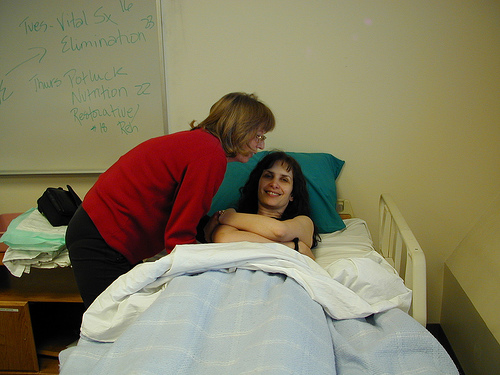Observation and Paperwork: Part 6 of a series on Personal Care Assistants: A Guide to Hiring, Training, and Firing
The first day of training for new personal care assistant (PCA) is usually one that is more about observation and paperwork than actual training. Although most people you work with will have had some experience at this type of work, it's important to realize that each person is different. I mean both the caregiver and care receiver.

Tolerance for Change
Any three PCAs trained at the same facility and by the same people will do some things three different ways. Additionally, the person receiving the care may want certain tasks done in a certain way while not giving a hang about others.
Having the new PCA observe how you and existing caregivers work together will tell them volumes about your personal style, physical requirements, the amount of work expected per shift, and the formality or ease of the household. I always encourage new staff to ask questions as they occur and to talk about their previous employment. This will give me insight into their personal styles.
Every new caregiver is a new relationship. That sounds very obvious but think about it. Assuming you are the one receiving the care, you and the new PCA will have to work intimately together. The nuances of mood and personality have to be learned. Patience is tremendously important for both parties. It's very easy to misunderstand and miscommunicate. For example, someone might speak gruffly but mean nothing by it.
I have always found it helpful to remind myself that while I'm being patient with new employees, they are probably being patient with me as well.
Feedback
As the employer, you must set the tone and pace. New employees can be oversensitive to criticism or behave as if they never heard it. Some of this can be attributed to nerves. If there is a repeated pattern of ignoring your direction then you must reconsider the individual hired. I'm not talking about micromanaging here. At some point, you must back off and allow your PCA some freedom to complete tasks in a manner they choose.
However, it is your house and your money. You have a right to have things done the way you wish. If someone does something you're not happy with then you need to address it then and there. Be an adult. Screaming and yelling will not get your point across. Be clear about the problem. If things do not improve then you might need to find someone else.
The core of the relationship has to be a positive give-and-take of information. This is not going to be one-sided. Hopefully, you've hired someone with intelligence and discrimination. It's important to listen as much as you talk. Your PCA will need to let you know about physical problems you might not be aware of or about problems in the house that you may not see. For example, I can't inspect the upstairs bedrooms. Someone has to help with that.
Personal Style
None of us is perfect. We all have good and bad days. Sometimes we snap when we don't mean to or overreact to a situation. Learn how to apologize when you are in the wrong and to be tolerant when your PCA has a bad day. That doesn't mean that your employee should bully you (and some will try) but that you shouldn't bully them either.
Abuse
At the very first sign of physical or emotional abuse, call someone (the authorities, family member, neighbor, or friend) and get that person out of your house and away from you. I would not provoke a confrontation until I had someone else in the house and maybe not even then. Abuse is occurring any time you feel frightened or threatened by a caregiver. Don't spend a lot of time wondering if you are overreacting. Get that person gone!
Be very careful what you say to the person you discharge. It can cause problems later. I'll cover that in another part of the series.
Taxes
The people who work for you are household employees. You can pay them cash and not do any withholding but the IRS considers that illegal except in a very limited number of circumstances. Think about the number of people running for office who have been caught not paying for their babysitters and other household employees.
It's also not necessary for you to withhold taxes from your employees if you plan to pay their share. I've included a link to the IRS website with information about household employees at the bottom of this hub.
Your accountant or a payroll service can take care of all this for you. I use an online service that only costs about eight dollars a month. It saves me headaches and keeps track of all the paperwork. I've included a link to that as well.
I withhold taxes, pay Social Security, Medicare, and unemployment. I have a low threshold for risk especially when it involves the government. Be aware that some people do not want to work for anything but cash. Again, make your own choices.
Paperwork
On the very first day of employment and usually as the first order of business, I have my new PCA fill out state and federal forms. It's not unusual for someone to want to take their forms home for a family member or advisor to help them.
I would be wary of advising any employee about the number of withholdings or how to complete the forms. I would not want to be responsible or held responsible for mistakes.
Almost all the forms you need are downloadable from the IRS website and your state tax website. At the very least you will need a W-4 with instructions and the equivalent state withholding tax form.
If your employee is a legal immigrant then you will need a few other forms like an I-9. Again, all these are on the IRS website. Your accountant should have copies as well.
I always make it clear that I cannot issue any sort of paycheck until I have all the completed forms returned. Generally it's not a problem. I also keep a copy of the driver's license and Social Security card in my files.
The next in the series will be on training day two.
Photo is courtesy of Geek2Nurse from Flickr
Links
- QuickBooks Online Free Accounting Software for Business
Try it Free! QuickBooks Online Accounting Software Creates Invoices, Pays Bills, Tracks Expenses. Online Accounting for Business is Now Easy. Free Trial. - Tax Topics - Topic 756 Employment Taxes for Household Employees










